Horseshoes in Indus Kohistan

|
Lat:
35:25.980000
Long:
74:04.980000 Horseshoes in Indus Kohistan
20th December 2005 35.433/74.083
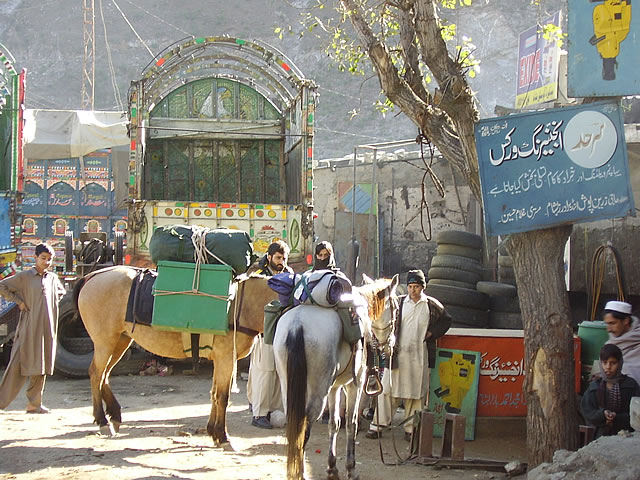 You will definitely find horseshoes in Besham,” the local
reiterated to me, as I stood dithering outside the farrier shop in Thakot. “What
do you think?” I asked another. “Oh for sure.” Both had a degree in idiocy and
they were both wrong. Locals often are when it comes to knowing anything outside
their immediate geographical area, but it’s the odd occasion they are right that
always makes me pause - conversely when it comes to doing something practical a
local who volunteers his help (albeit forcefully) is usualbly very good. It was
early morning and the shop wouldn’t open for at least another hour, so I decided
to push on. You will definitely find horseshoes in Besham,” the local
reiterated to me, as I stood dithering outside the farrier shop in Thakot. “What
do you think?” I asked another. “Oh for sure.” Both had a degree in idiocy and
they were both wrong. Locals often are when it comes to knowing anything outside
their immediate geographical area, but it’s the odd occasion they are right that
always makes me pause - conversely when it comes to doing something practical a
local who volunteers his help (albeit forcefully) is usualbly very good. It was
early morning and the shop wouldn’t open for at least another hour, so I decided
to push on.Besham lay at the start of Indus Kohistan, a wild frontier land, full of long bearded men and unpopular with the guide books. Since there were blatantly no horseshoes here I stabled the horses and took the next van back to Thakot. Several headaches later, a farrier was eventually found and arrangements made for him to come shoe both mares in Besham the following morning. Thus began an eventful journey through ‘the land of the ungoverned’. The trouble with horseshoes is...The farrier eventually arrived at 10.30am with a hammer and a tiny set of nail cutters more suited to a pint sized Shetland donkey than my two brutes. He looked at me sheepishly and said that nobody had told him what to expect or where to go. This is despite of two things. 1) The fact that he was carrying a large bag of extra sized horseshoes and 2) that I was present when he had been told to go to the PTDC motel which he had casually sailed past on his way into Besham. The shoes on both mares needed replacing; they had both managed over 330kms from Islamabad and six were almost worn down to the quick. The Long and short is that after some rather rudimentary work, both mares were shoed and we were again on our way. Thanks must be given to the PTDC Motel, Besham (see note) at this point for a splendid stay with fantastic hospitality. Each morning was a veritable feast of unlimited paratha (fried bread), omelette, toast, butter and marmalade with a fountain of hot milky tea. I didn’t want to leave![1] The land of the ungoverned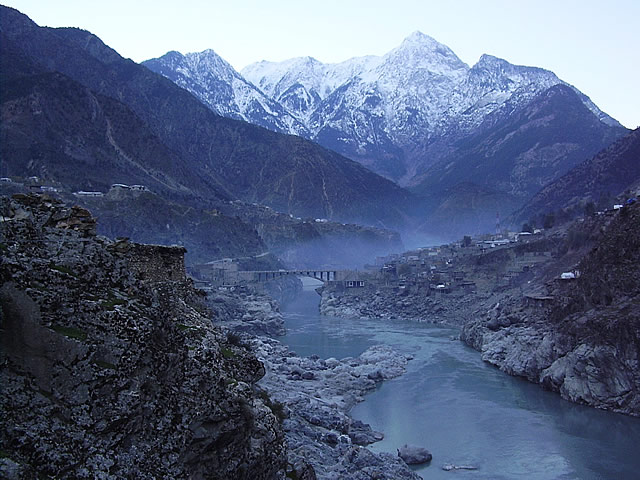 It was the 10th December. What lay ahead was nothingness. For long stretches we just trotted along barren rock. There was no grass, only scree and rock. Rock! That word cannot be stressed enough. The Indus became narrower and the mountains more ominous as their steady march into the clouds reached fruition. The biggest worry to me was the lack of people. Villages existed, but in impossible locations far above and below the road. These were the villages that made the relief operations so difficult for the aid agencies in the Earthquake areas. Each village is a separate family. The size of the family determining the size of the settlement. Tents still dominated every conceivable piece of flat ground. Aftershocks still rock the region to this day and nobody is confident enough in the stability of their houses to live inside them. The only other life on the road was the occasional marauding wild donkeys and packed out Toyota vans. Each one of the latter was like a battery hen factory on wheels with groups of scruffy men who enjoyed whooping like howler monkeys to try and scare the horses. This was Indus Kohistan. The days of bazaars (markets) being open until early evening, roadside grass and moreover people were finished. Days suddenly seemed to get shorter and colder. At each village from Besham the bazaars closed by late afternoon. Horse food was also scarcer and only available in huge bags of 20 - 40 kilos. This was certainly the most challenging part of my journey in Pakistan . All of the above realities were true. The area was certainly remote, with little water and little life. It’s a hostile place and the people are a reflection of that. Slightly wild, blatantly open and they see few outsiders. Few stop here. The land used to be called ‘Yagistan’ or ‘land of the ungoverned’ because cutthroats could hide in the many side valleys that riddle the region. My first night out of Besham was spent at Pattan. We arrived late evening with all the shops closed. Luckily I’d brought extra food along from Besham and the mares dined hungrily that night. As usual I spent the night outside next to animals on a rope bed placed across both to deter any would be thieves. I needn’t have worried about thieves. At midnight the winds began. I woke to a full blown gale that billowed my sleeping like a balloon and sent my sheets flying. The horses were both shivering so I wrapped extra blankets around them and weighted down my bedding with a heavier duvet. The winds apparently afflict Pattan for three days on and three days off throughout the winter. I cursed my luck tonight being the one they began again. 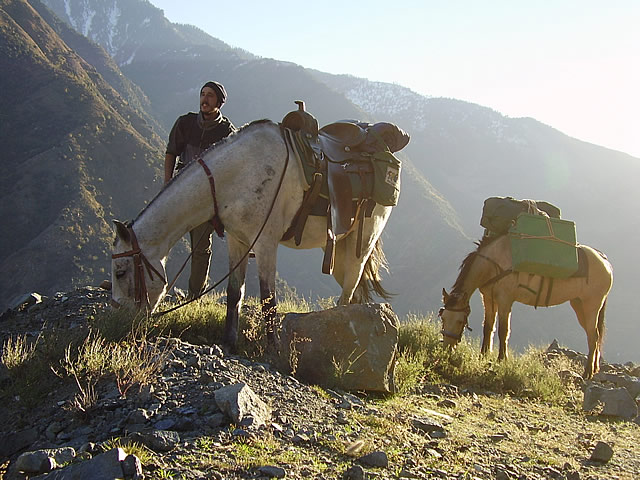 The following morning I bought sufficient food to last the night and the morning of the day after. A tactic I followed until I left Pakistan. By balancing the food in separate bags (I always carried two extra meals of approximately 6kgs each could be carried on each box. The road wound up at first seemingly endlessly before descending into never ending side valleys hidden from the sun. Sparse vegetation and trees gripped the hillside above the road as sheer rock faces towered around. There was no grass for the mares. With the wind blowing full gale and nobody else around, this felt like being a Pilgrim on a mountain crossing plodding along the solace of a lonely trail that wound up the hillside bathed in frosty shadow. The wind howled down the valley here and we had to battle to trot up it. The road was also notable. Literally blasted out of the sheer rock of the hillside. Eventually we reached Dasu, memorable for its sunrises that only mountains can make special. I left late the next day and it was a hard 45km ride through the night till I reached sleepy hamlet of Sumanala. But it changed my perception about riding by horseback and about the whole ‘hostile area’ I was riding through. It was cold and dark but I found I was happy. If I let my mind dwell on the situation, I would undoubtedly feel cold and isolated. Instead my mind settled into a blank state and the only thought was on reaching the next destination. The moon was full and I could see almost as much of the road as I could see in the daytime. I wasn’t as cold as I’d thought once I settled into the rhythmic beat of the horse’s gait and I relished the exclusivity (as in an early morning) that I then felt. The time also went by quickly. This area of the ‘ungoverned,’ was unjustifiably warned of by the guide books. On the whole I found the people as warm and friendly as anywhere in Pakistan . It is only misperception that cause such warnings and an outdated reputation. Perception is the key word. We live in a private and reserved society. These people certainly have nothing of the such. But when you go you understand and you are a better person for it. Sumanala was more a truckers stop than a hamlet yet these are the places I love the most. When I arrived it was already midnight but I got a warm reception. The owner was called Omer Riaz and he actually offered a separate room for the mares. Huddling around the fire that night we sat up late talking in Urdu, and surviving on a lifeline of never ceasing hot chai. Omar put a pot of hot coals next to my seat and I dined on fried beef and naan; my favourite meal in Pakistan . I took a room next to the enclave at the back where the ponies were settled and slept late after, playing games and discussing the reasons that foreigners undertake such journeys. Simple. They are all mad![2] Horseshoes again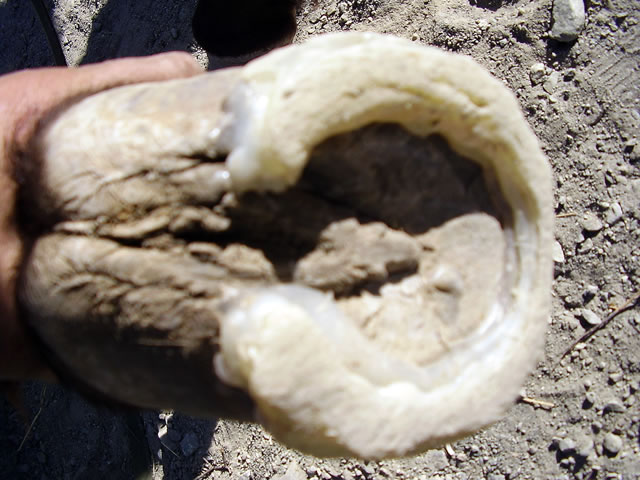 Four days after fixing new shoes on the mares, they needed doing again. I cursed the fool who had fixed such low quality metal to my horse’s feet. They turned out to have been locally made from reinforcement iron. Yet further I cursed myself for not having had the foresight to purchase better quality extra ones in Islamabad . Luckily I did have spares with me from Besham but they were the same low quality as the ones presently being used. The only problem was that the only available farrier was 60kms further along he KKH at Chilas and time was not on my side. The logical solution would have been to go straight to Chilas and bring a farrier back with me and have the mares feet fixed once and for all. I on the other hand decided to do it myself. I was short on time and I had a solution. I have with me a product called Superfast made by a reputed company called Vettec from the USA . This hoof care product applies to the bottom of the hoof and sets in 2.5 minutes. It would also save the mares hoof from becomes too ‘holed’ from repeated shoeing. Read the full trial report: Superfast - Conquering the Himalayas Despite seeing it done many times before, I had never removed horseshoes before and it took me a full day to fix the product to Kabul ’s feet. It took another one to give up attempting to fix it to Spark’s two back ones. The obstinate animal only pumped her back legs whenever I got within striking distance of them. With so much time wasted I did what I should have done earlier and traveled to Chilas. At Chilas I met with a locally famous polo player called Soon Khan who was generous enought to return back with me the same night. Soon Khan was the son of the even more famous Saeed Khan, a legend in his time for the risks and skill he employed on the polo field. Even better, he was also a farrier. The following morning he took only thirty minutes to get Sparks trussed up and shod. Keeping calm and detached has helped me solve so many problems on this trip but those two days in Shatial were two of the most frustrating of the journey so far. I couldn’t shake off the sense of anger over not being able to do the task quickly. Time was always at the forefront and in an area where nobody kept horses, time was a commodity I needed the most. That is except for the three equines who lived by the river. The Riverside RomeosMidnight. All is peaceful in the quiet frontier town of Shatial on the Karakorum Highway. Suddenly a piercing whinny breaks the air. Three local wild male horses had stealthed through the night and were busy trying for some action with Sparks and Kabul . My charpoay was placed outside near to them as always. I’d only been asleep for a few hours and as the first whinny broke I desperately hoped that it wasn’t what the guesthouse owner had warned me about earlier. I was snugly cocooned under three thick blankets and running barefoot after wild horses wasn’t very inviting. However needs must. I jumped out of bed and sprinted after the would-be Romeos who cantered off up the hill. Again slumber was just welcoming when another whinny shattered my hopes. A second time I chased them off, whizzing stones at their shaggy behinds. But these chaps were randy and weren’t giving up - as they didn’t for the entire three nights we were in Shatial. They were admirably crafty. As soon as I was back in bed they would creep back and wait in the shadows, deathly still so I couldn’t see them. Then they’d make a move. Yet gradually I figured out their tactics. They always came by the same routes from the riverside and through deduction I could figure out where they would be waiting after I’d chased them off. Gradually stones met their mark and the Romeos took less persuading as the nights passed. Horseshoes Once Again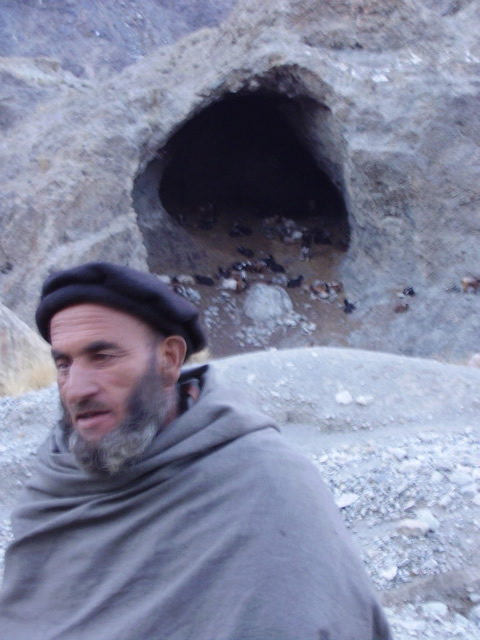 Not far outside of Shatial and one of the horseshoes that Soon Khan had recently fitted was coming off. I just couldn’t believe it. Luckily this time I was experienced and I had her myself trussed up and with a fresh application of Superfast on the effected back foot. The Superfast did the job and lasted over 50kms on both Sparks and Kabul before a new layer was needed. At Chilas I spent a cozy night at Soon Khan’s house who also tried to gift me with half of his riding equipment. The next morning we chipped off the last of the temporary Superfast and applied more low grade horseshoes until Gilgit. This was the only other town that good quality horseshoes were available due to the popularity of Polo there. From Gilgit onwards, there was never any future problems with horseshoes.[3] Final thoughtsMountains go by slowly, days go by quickly but in segments. Riding during the day and night is done on automatic. This whole ride is done on automatic where you settle into a routine and don’t emerge from it until it’s over. There are waking moments and these make the most vivid memories. Other
Jottings…
|